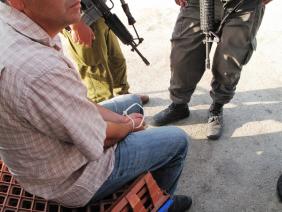Za'tara (Tapuah), Thu 11.7.13, Afternoon
Translator: Charles K.
.jpg)
True, five days a week I pass the Tapuach checkpoint in the heart of the West Bank, on the Palestinians’ main lifeline, and there are no soldiers in position and Palestinian cars go through easily and reach their destinations at a reasonable hour. But, at least once a week, and always, always unannounced (to the Palestinians), Border
 in checkpoints are no longer visible at some of them.
in checkpoints are no longer visible at some of them..jpg)
Most people are fasting, all have plans, they’re all trying to live as normally as possible and today they’ve
all been screwed. And they’ll be screwed again three days from now, and next week - and that’s all…part of the “easings.”

Fifteen minutes after we arrived all the detained cars were released (except for two which remained for two hours longer), and then we see, in the middle of the checkpoint, beneath the guard tower – two children, aged 8-10, sitting on a low post, a huge Border Police soldier looming over them, frightening, threatening. We approach and ask why the children are at the checkpoint without an adult, and the soldier explains that they arrived in a car with their father and uncle, and the father and children were removed from the car. The soldiers say they asked the uncle to take the children but he fled in the car. The children were terrified and very hostile. The older was crying and when I began to speak to them the younger also started to cry. They refused to talk to me or to the soldiers. They sat quietly, eyes opened wide in fear, and from time to time one lowered his head and his shoulders trembled as he wept silently. The huge soldier felt bad about the situation, or, to be more accurate, how it looked. His commander kept trying to chase us away.
We tried to tell the police it was illegal to detain children without the presence of an adult to represent them, especially since they hadn’t done anything, but that didn’t bother the police at all. At any given moment 7-10 soldiers stood around joking, talking and felt no discomfort about the situation. Phone calls to Chana B., and through her to various headquarters resulted in the father being brought to the checkpoint an hour and a quarter after we arrived (and who knows how long the two little ones had sat there before we came), his hands cuffed behind him, and seated on a chair next to the children. They didn’t exchange a word, but the children didn’t take their eyes off their cuffed father. His palms were red and swollen, indicating he’d been that way for a long time. In response to his request the cuffs were removed and put back on again with his hands in front of him. Another lesson taught to children by the local school of hatred.
A few soldiers arrived at the checkpoint, and the buddy-buddy backslapping and laughter and fun and good time went on right above the children. Half an hour later the father, despairing, told the children to walk home (their village is 10 kilometers away). The soldiers tried to object but finally permitted the children to leave the checkpoint, but we saw them farther along the road talking to a truck driver who stood next to them. We drove to a place where we could turn around and when we returned saw the children returning to the checkpoint, to their father.
